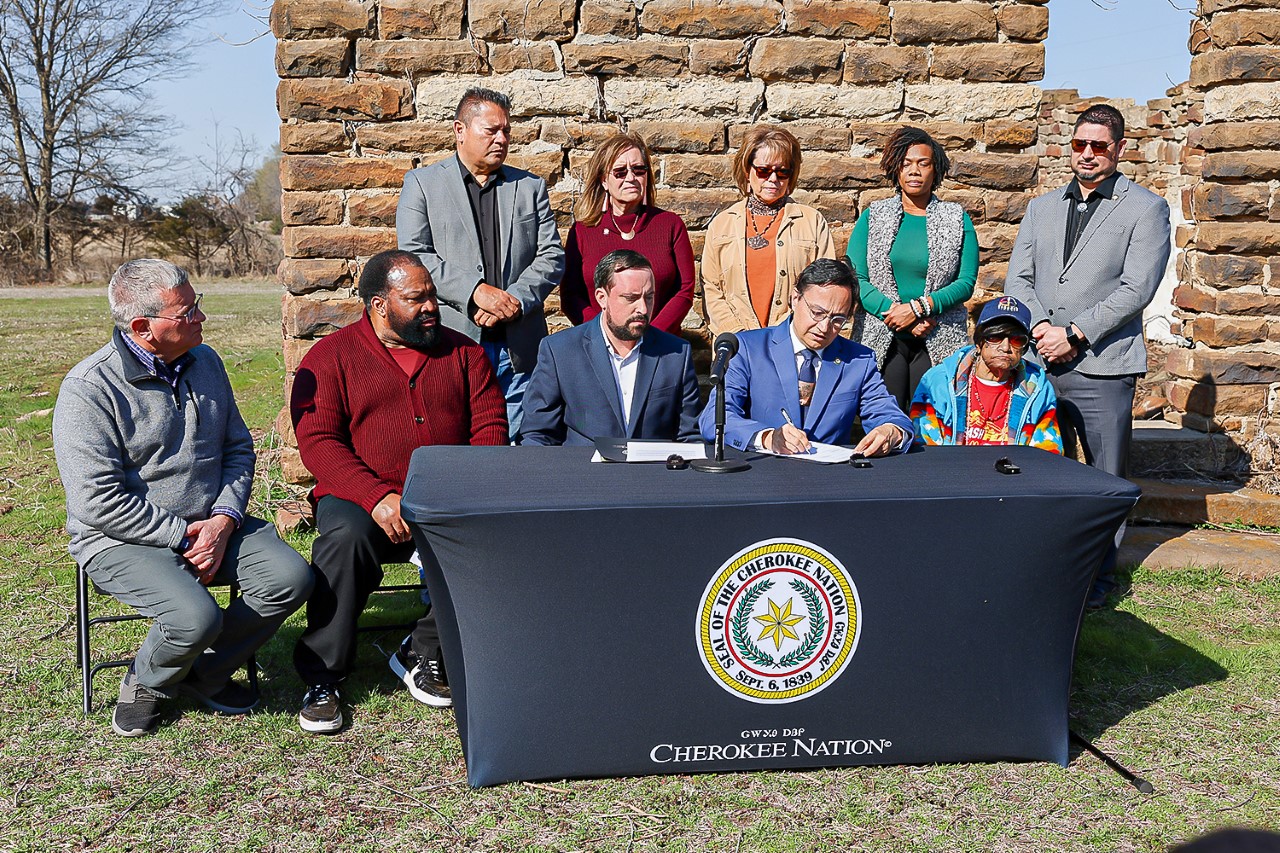SOUTH COFFEYVILLE, Okla. — Cherokee Nation Principal Chief Chuck Hoskin Jr. signed new legislation Tuesday that will commit $1 million to a new fund to preserve the tribe’s historic sites and authorize official biographies of past leaders.
The “Cherokee Nation Historic Places Preservation Fund Act,” which passed the Council of the Cherokee Nation on Monday expands on Chief Hoskin and Deputy Chief Brian Warner’s landmark “Cherokee Nation Historic Registry Act of 2019,” which empowered the tribe’s Secretary of Natural Resources to designate historic sites across the 7,000 square-mile Cherokee Nation Reservation.
The new law creates a Historic Places Preservation Fund and transfers $1 million of existing cultural review revenue to the new fund. The fund will receive annual proceeds of agriculture and business leases of up to $1 million per year after the initial funding. The new fund will also receive 50 percent of fines collected for violations of the Historic Registry Act and be eligible for special council appropriations.
“The Historic Registry Act of 2019 made the designation and protection of Cherokee Nation historic sites a high priority for our tribal Nation,” said Chief Hoskin. “Our new legislation creates a dedicated funding stream so that we can preserve these sites for generations to come.”
Since the original law’s enactment in December 2019, Secretary of Natural Resources Chad Harsha has placed 15 sites on the tribe’s Historic Registry through the law’s administrative process.
A 16th site, Little Flock Baptist Church in Nowata County was added to the tribe’s historic registry on Tuesday.
Little Flock church played an integral part of the surrounding Cherokee Freedmen community for more than 100 years in both religious, educational and cultural history.
Originally built in the early 1900s, the structure is representative of the stone masonry work commonly found in Cherokee Freedmen communities.
Some other sites included on the registry are the Saline Courthouse, Hunter’s Home, Cherokee National Capitol “Cherokee National History Museum” and Ross cemetery.
“This legislation adds to what we already do and makes historic preservation work the Nation’s priority that it must be,” said Deputy Chief Warner. “We have an obligation to not only identify and protect places of great importance to Cherokee history and culture, we need to continually make funds available to save these sites as part of our enduring heritage.”
Secretary of Natural Resources Chad Harsha said he expects his office and CNB cultural tourism to work hand in hand on prioritizing work on historic sites.
“We are fortunate to have knowledgeable and hard-working staff in our department of Natural Resources and at CNB,” said Secretary Harsha. “This new funding will simply give these dedicated professionals more resources to continue their vital work.”
The legislation also authorizes the Secretary of Natural Resources to commission brief official biographies of former Principal Chiefs as well as official histories of the tribe’s legislative and judicial branches. For former leaders of the modern era, the law requires consultation with those leaders or their estates in crafting biographies.
The legislation’s lead sponsor, Councilman Keith Austin of Rogers County, said the amendments to the Historic Registry Act will benefit future generations.
“Part of our oath of office says we must promote the culture., heritage and traditions of the Cherokee Nation. It’s vital to our tribe that we not only protect our history and these sites that hold our history, but also have the set aside funds to do the necessary work,” Councilman Austin said. “I’m also extremely proud of the focused efforts in this law to accurately document the stories of the previous leaders of the Cherokee Nation. As a constitutional government, it is important we have informed citizenry. These biographies, collections and historic efforts will ensure future generations are better informed of all that came before them.”
Chief Hoskin signed the Cherokee Nation Historic Places Preservation Fund Act at a ceremony at Little Flock Church on Tuesday attended by Cherokee Nation officials, church leaders and local residents.
Secretary Harsha said the original stone church structure, which sits next to the church’s current wood frame facility, would be considered for restoration work under the new law along with all other sites on the registry.
A list of sites on the Cherokee Nation Registry of Historic Places can be found on the tribe’s website www.cherokee.org.

